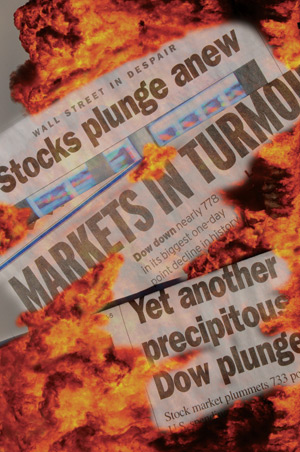If you were in charge of the current administration, is there anything you would do differently in order to stimulate shelter markets?
I’m not sure there is anything Obama can do to stimulate shelter. They have a program in place to give first-time homebuyers a credit towards the purchase of a home. I think they should keep that in place. I hate to say this because I am a startlingly large owner of residential housing, but I think home values are going to have to fall until demand equilibrates with supply. I hate to say this, but it just hasn’t fallen enough.
Do you think it is a matter of the demand curve?
It is absolutely a matter of the demand curve and the supply curve meeting at a certain point. People just will not pay the prices being asked for too many houses in this market. We have a situation here in Southern California where, when houses are priced sensibly, they sell in hours. If they’re priced by people in denial about what their houses are really worth, they do not sell. Too many people are still dreaming that they are somehow going to get 2007 prices. The real fair market value is often an extremely painful price.
Is there anything we can do to stop the hemorrhage of foreclosures?
I don’t know if we even want to stop the hemorrhage of foreclosures. The problem for the homeowners who are being foreclosed is overwhelming pain and misery. I have close friends whose homes have been foreclosed upon and some about to be foreclosed upon. They are in a situation of absolute abject misery. On the other hand, if you are a lender and the government steps in and says you cannot foreclose on the security for your loan, it scares you to death because you do not want to make loans in the future. We do not want the lenders so frightened that they do not make loans in the future. I think it’s a heartbreaking situation for people that have foreclosed homes, but to step into the middle of that area of contract law and prevent foreclosures is very, very dicey.
Looking ahead, what, proactively, can small- to medium-sized businesses employ, taking into consideration softening in shelter sectors, while other sectors might strengthen?
I hate to say this, but I think this is the problem with the economy. I wouldn’t be extending myself or getting into any new hiring situations or any new investment situations until I have a very clear idea of what the Obama administration’s tax policies, environmental policies and medical policies are going to be. This is precisely the problem. There’s just too much uncertainty in this economy.
If you had the easy button, what would you do with the marginal tax rates?
I would not change them until the economy starts to recover quite a lot. We face a budgetary catastrophe in this country when the real full-bird Medicare and Social Security start coming due. It is going to be absolutely devastating for the United States in terms of budgetary issues. There are three ways it can be met: first, cut expenditures. Second, I think they will have to means test Social Security and Medicare so people at my level will not get Social Security and Medicare. Third, they’re going to raise taxes on upper-income people, which unfortunately, means me. Well, it’s not really unfortunate—it’s really fortunate that I am in that position. They are going to have to resort to the printing press too so we are going to have to have some inflation. They could solve all the problems just by printing money and paying for everything with printed money, but it would destroy the middle class.
If the legislation and administration had its way, what do you think they would do to estate taxes?
Mr. Obama is on record as saying he wants to have estate taxes at roughly the level they were when Mr. Bush became president. Therefore, that means higher estate taxes. At this point, we have no estate tax in this country for this year. Mr. Obama’s friends in Congress are on record as favoring a higher threshold for the estate tax; but then, once the threshold has reached a higher percentage of tax, I think we’re going to get a higher estate tax. I think we’re going to get higher taxes on well-to-do people, which are often small businessmen. I think we’re going to get higher taxes on everybody except quite poor people. I think even middleclass people are going to start paying higher taxes. At some point, somebody is going to go into President Obama’s office and say, “Look, we are facing a hyper-inflationary catastrophe here unless we really put our house in order.” I think Mr. Obama will have the good sense to do, at this point, what he needs to avoid a hyper-inflationary catastrophe.
 Do you see any similarities to what preempted Venezuela’s recent devaluing of their currency? Could the United States see its currency devalue like Weimar Germany?
Do you see any similarities to what preempted Venezuela’s recent devaluing of their currency? Could the United States see its currency devalue like Weimar Germany?
Your question reminded of a great short story told by Ernest Hemingway. He ran into someone in a New York bar after the stock market crashed. That person had been formerly rich and now was poor. Hemingway asked the man how he got to be poor. The man said, “Slowly and then all at once.” I think that is our danger with inflation. It seems really, really far away at this point. However, at some point, it’s going to just be upon us and the effects could be ruinous; hopefully, not as ruinous as Weimar’s inflation.
Are you saying that inflation creeps along and then, all of a sudden, goes vertical?
Inflation creeps along—one month it’s one-tenth of a percent, then it’s five-tenths of a percent, then it’s eight-tenths of a percent, then it’s one-and-a-half percent, then it’s three percent, then it’s four percent. Suddenly, it’s absolutely out of control. I do not believe it will not get as out of control as back in the 70s and early 80s. Unions had multiple cost of living increases from union contracts, and a large percent of the population of workers were unionized in 70s and 80s. Today, we don’t use cost of living clauses as aggressively, so inflationary increases don’t automatically get built into labor costs. That is a great relief. We don’t have as much of the population in the unions. Approximately eight percent of American workers are in unions outside of government. In the government, it is a higher percentage. The smaller union footprint helps retard inflation. If inflation really starts, once it gets rolling, it’s nightmarishly difficult to stop it.
Do you see any similarity in the methods used to recover from President Carter’s economy?
Well, the Carter years ended in a grueling, horrible recession, along with high inflation. I fully understand why people are complaining about the current economic condition; it is a very bad situation. We should remember in the late 70s and early 80s, we were having years when we had unemployment above 10 percent and inflation above 10 percent. Even worse, we had to raise interest rates to 20 percent to put the brakes on inflation. Talk about a bad situation—that’s really bad. If we started to do that again, there would be screaming. Can you imagine people with variable mortgages when the LIBOR is 20 percent? Can you imagine the pain in those people’s lives? The construction industry, forestry industry, every kind of skilled craft would be devastated. This is why it is very important that we not go back to inflation.
What potential impact might precipitate from capital gains hikes, penalties or other hidden taxes?
I can’t see Mr. Obama letting the capital gains rate be as low as Mr. Bush pushed it through. That was a great move by Bush. I may say that was one of his best moves but he gets very little credit for it. It’s very hard to believe, given the track record of current spending, that tax rates won’t increase. I hear from my people in Washington, who follow these things better than I, this year was the year for environmental policies and health care, in which they really got very little done. Next year is going to be the year for taxes on the rich. They believe it is a good election theme going after the fat cats and taking their money away from them. If that is true, then 2010-2011 is going to be about soaking the rich. This could be a real bad situation for business owners. I take comfort in the fact that if Republicans have a strong showing in the polls, Mr. Obama will be somewhat chastised in upcoming elections if he follows a policy of sticking it to the rich.
Can you potentially see a governor on marginal tax rates?
No, there will be no governor on that. They can raise them. For rich people, they can raise them. Look, we have had situations in which we had extraordinarily high marginal tax rates on well-to-do people. When I was a child, the marginal tax rate for upper-income people, which was defined as incomes of $100,000 and above, was above 90 percent. I believe it was 91 percent. So, we could certainly have rates that high again. It would not be good, and there would be yelling and screaming about it, but we could have rates that high again on very rich people. The House of Representatives just blithely passed a 5.3 percentage rate increase on the incomes of $1 million or more, and there are a lot of people who have incomes of $1 million or more. That just sailed right through; it was just one little blip. Higher rates could and will come if the Democrats have their way. I don’t blame them for doing it, frankly. The money’s got to come from somewhere.





Interesting interview. I would have also liked to heard what Bens thoughts were on the economic stimulus and weather or not it was really working. Like this guy did http://blog.heritage.org/2010/02/24/cbo-report-was-pre-ordained-to-show-the-stimulus-succeeded/